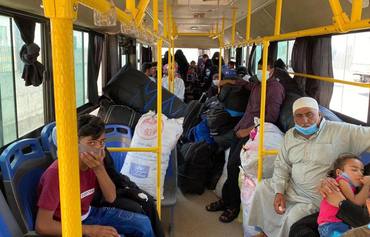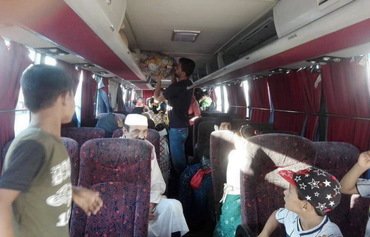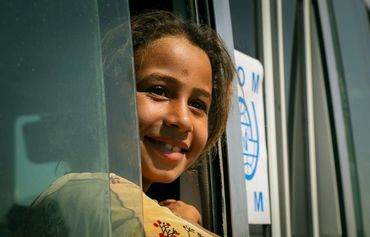Iraq's Ministry of Migration and Displacement has closed down 10 camps that previously housed displaced families who have returned to their homes, an official told Diyaruna Friday (November 6th).
The ministry shut down the camps last month after facilitating the voluntary return of displaced families, said Ali Jahankir, director general of the ministry's Directorate for Branch Affairs.
These include the al-Nabi Yunus camp in al-Nahrawan, south of Baghdad, and al-Ahl and al-Shams camps in Abu Ghraib, west of Baghdad -- which previously housed 172 families who returned to their homes in Anbar province, he told Diyaruna.
Around 60 families have returned to their original areas in Salaheddine and Ninawa provinces from Camp Saad in Diyala, he said, adding that a camp in Karbala that housed 560 internally displaced persons (IDPs) has also been shut down.
![Families living in the Saad displacement camp in Diyala province move their personal belongings in preparation for their return to their homes. [Photo courtesy of the Iraq Ministry of Migration and Displacement]](/cnmi_di/images/2020/11/06/26889-Iraq-Camp-Saad-600_384.jpg)
Families living in the Saad displacement camp in Diyala province move their personal belongings in preparation for their return to their homes. [Photo courtesy of the Iraq Ministry of Migration and Displacement]
Jahankir said authorities this month will shut down another seven of the remaining 38 displacement camps. They are proceeding based on an emergency plan drafted by the ministry that aims to reduce the number of camps by closing or merging them.
"We intend to close this month camps located in Erbil, Anbar, Khanaqeen district (Diyala province), Kirkuk and al-Suleimaniya," he said.
The ministry continues to encourage the voluntary return of citizens currently living in camps, he added.
On Thursday, 55 families (around 420 IDPs) returned to their original areas in Salaheddine's Samarra villages, and 146 families (750 IDPs) returned from the Hammam al-Alil camp to Mosul and its outskirts, said Jahankir.
Additionally, 179 IDPs from al-Madina al-Siyahiya and Ameriyat al-Fallujah camps in Anbar were brought back to their original areas in the province.
Remaining IDPs encouraged to return home
The ministry has been focusing its services on facilitating the process of returning families and increasing humanitarian aid to these segments, he said.
It has also called on humanitarian organisations to direct assistance toward helping these families rehabilitate their homes and re-integrate into their communities, he said.
"This does not mean we will no longer support IDPs in camps," said Jahankir, stressing that the ministry will continue to provide all necessary assistance.
"But we hope that families with nothing standing in their way to return will understand that remaining in the camps is unhelpful, and that they must take the decision to return to their homes quickly in order to resume their lives in their original communities," he said.
Thousands of Iraqis were displaced from their homes after the "Islamic State of Iraq and Syria" (ISIS) overran large swathes of the country in 2014. The war to oust the group also caused waves of displacement from areas that saw heavy fighting.
"The state of displacement was caused by an emergency, and today, after many of its causes have been removed, the responsibility lies with the IDPs themselves, who are encouraged to return home," said Jahankir.
"A [displacement] camp, equipped with services and food aid as it may be, cannot be a suitable environment for long-term residence," he noted.
Regarding Yazidi IDPs, Jahankir said that "some 16 displacement camps, most of them in the Kurdish region, are currently housing at least 30,000 Yazidis".
The return of Yazidi IDPs to Sinjar has been slow, he said, expressing hope that the October 9th agreement between the Iraqi government and the Kurdish region to normalise conditions in the district will help end the five-year Yazidi displacement crisis.

![A new batch of 179 IDPs returned to their original areas in Anbar province on November 5th. [Photo courtesy of the Iraqi Ministry of Migration and Displacement]](/cnmi_di/images/2020/11/06/26888-Iraq-Anbar-IDPs-600_384.jpg)






